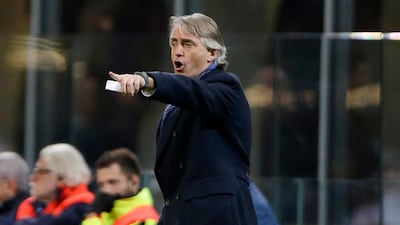A distinguished, disparate set of managers line up in the last 32 of the Europa League. There are previous winners, like Diego Simeone, who has taken his Atletico Madrid to a pair of Uefa Champions League finals but will never speak patronisingly about Europa’s secondary club competition. Atletico’s Europa League triumph in 2012 was the springboard for their modern revival, Simeone always maintains.
There are those for whom Europe has been a frustrating hurdle. Like Arsene Wenger, who has never won a major European trophy, but has finished second in each of the Champions League, the Uefa Cup, and the defunct Cup Winners Cup in his long career. Or Simeone’s former Lazio teammate Roberto Mancini, who brings his Zenit Saint Petersburg to Glasgow for the first leg of an enticing tie against Celtic entitled to think his fortunes in European competitions are overdue a turn for the better.
Mancini’s Premier League and Serie A trophies as a manager recommend him as an elite member of his profession. But Europe has been a bugbear for longer than he cares to remember. Thursday will be the 53-year-old Italian’s 116th European match as a manager. None of those have been finals.
He came into management young, dashing and admired, except by a few older Italians who complained his elevation to a Serie A job – at Fiorentina – within weeks of his retiring as a player was too fast-tracked, and that he hadn’t served a proper apprenticeship. He was 36, and quickly his hair grew grayer; Fiorentina were on the edge of bankruptcy at the time. But he worked wonders on scant resources.
Mancini was not yet 40 when he guided Lazio, another club counting the cost of having built up large debts, to the semi-finals of the Uefa Cup in 2003. His bad luck was to run into another ambitious young manager, one Jose Mourinho, whose Porto went on to win the competition.
______________
Read more:
- Watch: Jurgen Klopp insists Liverpool can compete with the best ahead of Champions League tie
- Allegri annoyed by Juventus criticism after Tottenham fight back to draw Champions League match
- Watch: Gundogan says expect more from Manchester City after thrashing of Basel
______________
Then, as the jobs got bigger, the European campaigns got shorter. Mancini resurrected Inter Milan as a force within Italy, breaking an 18-year drought for a league title, and going to guide Inter to three successive Serie A crowns. But in Europe, they retreated: Quarter-finalists twice in the Champions League, then twice knocked out at the last-16 stage under Mancini.
His Manchester City, famously cool under pressure when they won the 2011/12 Premier League in the dramatic final seconds of the season, turned naive and panicky in Europe. As English champions they even contrived to go through a whole group phase without a win. The previous season, on one notorious night at Bayern Munich, Mancini asked his striker Carlos Tevez to step off the bench, and warm up to try and retrieve a losing situation and alleged that Tevez said no. The repercussions of that meltdown lasted months.
Mancini did take Galatasaray to an unlikely last-16 spot, guiding the Turkish club out of a group including Juventus and Real Madrid. His memory of Celtic Park meanwhile, is positive. In his second spell at Inter, which ended in 2016, he came to Glasgow and, on a Europa League night of pure adrenaline, see-sawed through a 3-3 draw, Inter winning the second leg 1-0. That, his last adventure in the knockout stages of Europe, was a good as it got, Wolfsburg disposing of Inter at the last-16 stage.
Mancini knows the stadium will hum on Thursday. “I remember the incredible atmosphere here,” he said, braced against the damp cold which ordinarily would not bother his Russian players but as they are freshly arrived from winter-break training in Turkey, seemed arresting.
“Our challenge is that we haven’t played any competitive football for a while,” Mancini said. “This will be our first official game since December and that is a disadvantage.” The mid-season break in the Russian Premier League, where Zenit are second in the table, lasts until March.
Mancini hopes striker Alex Kokorin, above all, can shake off any rustiness. The Russia international, expected to spearhead his country’s attack at his home World Cup, has a big year ahead. He comes into 2018 in form, with eight Europa League goals so far. “He’s improving in all facets and has the making of a champion,” Mancini said.


